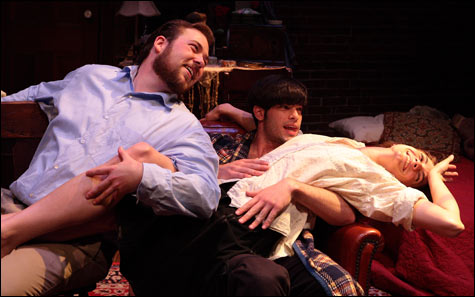
LOOK BACK IN ANGER: John Osborne’s Angry Young Man strikes a chord with Orfeo. |
Audiences must have developed shock absorbers over the course of the past 50 years, because it’s almost impossible to imagine the outrage evoked in their respective times by John Osborne’s 1956 Look Back in Anger, which was described by one critic as “misanthropy among the garbage cans,” and Joe Orton’s 1969 What the Butler Saw, which on its opening night prompted cries from the gallery of “Filth!” Osborne’s play shook the genteel underpinnings of the British theater, whacking away at the drawing-room gewgaws with a kitchen sink wrenched from the wall by an Angry Young Man. Orton’s gender-bent madhouse farce attacked the Establishment by spraypainting the trappings of classical comedy with a bright lacquer of Wildean artifice and polymorphous perversity. Both plays were landmarks. But looking back on them with candor rather than anger, it’s hard to imagine the Playboy of the Western World–worthy ruckuses they raised.
In some ways, Look Back in Anger seems a curious choice for Orfeo Group, a collective of young theater artists out to seduce an audience for whom theatergoing is not a regular occurrence. To that end, the troupe is offering a free and very creditable Actors’ Equity Association Members’ Project Code production of Osborne’s rarely produced if historically important drama in the cramped, claustrophobic, absolutely apt Factory Theatre in the South End (through July 6). You might think the twentysomething troupers would be put off by the play’s old-fashioned structure, its sexism, and its teatime talkiness, however volatile. But the embittered disenfranchisement of intelligent, dead-ended, 25-year-old Jimmy Porter seems to have struck a chord with these members of a generation feeling fenced out of a craven America ruled by rich Republicans. Never mind that Osborne’s enraged if sensitive working-class protagonist lashes out at all things posh and sundry through the emotional punching bag of the passive upper-class wife ironing his shirts and sharing his life of loudmouthed desperation.
Jimmy and Alison Porter split their rented digs with Jimmy’s Welsh working-class chum and sweet-stall co-operator, the gentler Cliff Lewis, who serves as a sort of junior punching bag, confidant, and referee. When Alison’s upper-class friend, Helena Charles, shows up to slum it temporarily with the crew, the odd family dynamic splinters and socio-economic and sexual tensions come to a head, with Alison, who is pregnant, eventually being whisked off by her father, a mastodon of Empire who served 30 years as a British army officer in India and is described by Jimmy as “one of those sturdy old plants left over from the Edwardian Wilderness that can’t understand why the sun isn’t shining any more.” Whereupon Helena’s mixed motives come to light — she can’t take over Alison’s bed and iron fast enough.
Actor Gabriel Kuttner helms the period-faithful production on Cristina Todesco’s old-furniture-crammed set in a space so small that the testosterone-fueled fisticuffs, linguistic vitriol, sexual steam, and little-boy-lost remorse spill out over the audience like splashes from that non-existent kitchen sink. (An irony of the drama, which helped forge that coinage, is that all water has to be fetched from the bathroom.) And the performances are nicely calibrated to the space, so that you feel the friction of tight quarters but no one appears to be overacting.